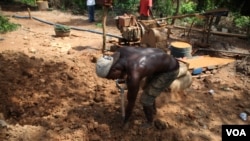Gold mining puts money in the pockets of thousands in Ghana’s countryside. It also kills. Pit collapses claim the lives of the miners who delve deep into small-scale mines in search of bullion. But in Ghana’s poor, underdeveloped villages, people say there are few other ways to make money.
The rivers in Ghana’s Ashanti region run a sickly brown. The land is pockmarked with gashes carved into the earth by excavators, the air filled with the sound of mining equipment.
Small-scale mines are a common sight in Ghana’s gold-rich middle belt, where miners drop deep into the earth in search of bullion. They don’t always come back.
Last year, a collapse killed 17 people at a small-scale mine in Central Region. Earlier this year, another collapse in the village of Kyekyewere in Ashanti Region killed six miners. Local officials say many other collapses go unreported.
Sebastian Aduko has been in this business for 13 years. It is undeniably dangerous, he said, but the risk can be mitigated if mines are built properly.
“The moment we are all rushing to collect what we all wanted from the ground there. So definitely it will collapse. So that’s why we can explain that the other side we heard that maybe this hole have collapse, maybe three, 10 people have died through there. Because, if we are watching that, there’s not anything that look like a cage that we are using like here,” said Aduko.
Down a dirt road and through a mining concession lies the Atunsu Cocoase small-scale mine. The operators say they follow government regulations and work on land leased from a local village.
It’s a profitable business, one that’s not hard to hire for, said Said Abubakari, chairman of the mine’s management committee.
“Anyone can do it, that is why. There is no education background to say unless you get HND certificate, you have to get up to university level before you come and do it. The moment you are 18 years, the moment you reach at 18 years, then you are free to come and join it. It’s a free work,” said Abubakari.
Nana Kofi Gyau, a local district assemblyman, said the mines are hardly benign. No one collects water from the local streams anymore because of pollutants. Villages are forced to rely on boreholes. Meanwhile, farmers are selling off their land so mines can grow.
But many young men have little choice. There are few jobs in the countryside. If you can dig, perhaps you will have a chance, Gyau said.
“So far as there’s no work and the people are also feeling hungry, they will go and find, because the money is on the ground. They won’t sit down and feel hungry so far as the money is on the ground. God has given us a lot of money in the soil, so they have to fight for it,” said Gyau.
At this time of year, Abubuakari’s mine is quiet. The water table is high, making deep excavation difficult. When the water drops, Abubakari says thousands will arrive at the mine, digging up the land to put food on their tables.





